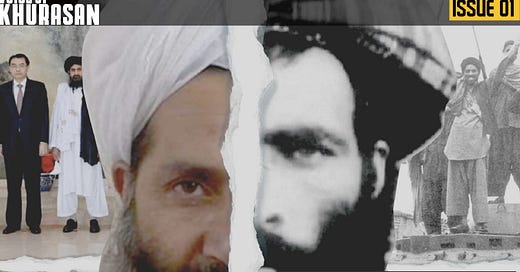The first month of 2022 began with the Islamic State Khurasan Province (ISKP) releasing a video and concluded with them releasing their English language magazine. The premier issue begins with ISKP warning the world that the loss of territory in Iraq and Syria was just a mere setback and goes on to boast about its gains and numerous victories in the African subcontinent, as evidence that the group is expanding and is far from being defeated. The magazine tells the world to look carefully at Iraq, Syria and Khorasan and once again warns that the Islamic State (IS) is on the rise again and is getting stronger day by day.
The group tells a brief history of the Taliban movement. ISKP claims that the Taliban was created by ISI (Pakistani intelligence agency) and sponsored by the CIA and Saudi Arabia. The group, according to ISKP, is the amalgamation of the ideologies of the Deobandi school of thought and Sufism — which has ruled the country under the jurisprudence of Hanafism. The group accuses the Taliban of having close relations with the Pakistani state (labelling them as Taghut) despite claiming itself to be a pure Islamic Emirate. ISKP says the Taliban's deception was uncovered when Mullah Omar, its previous chief, was dead yet the Taliban kept releasing statements in his name.
The second chief of the Taliban, Mullah Akhtar Mansoor, has been labelled as an Iranian agent. The magazine takes a dig at Taliban fighters saying that they have no knowledge of the whereabouts of their current chief, Mullah Hibatullah Akhundzada, who is yet to make an appearance on camera since the Taliban takeover of Kabul last year in August.
Various accusations are levelled against the group, from adopting a laissez-faire approach in dealing with the production and trade of opium, practicing shirk and superstitions and homosexuality. Calling the Taliban murtad (apostates), ISKP says the group is a proponent of extreme nationalism and tribalism, talks about the infighting present within the group (between Pashtuns, Uzbeks, Turkmen etc.).
The magazine talks about atrocities committed by the Taliban recently on Salafi scholars who opposed their deviances by labelling them as Wahabi, Khawarij.
ISKP talks about the Taliban siding with the Shī’ah community by celebrating their festivals, protecting their places of worship and having created a militia to fight ISKP in the capital of Bamiyan province (Hazara Shī’ah majority area), criticizes the Doha deal, their alliance with Iran, Russia, China, their weak stance on the Uyghur issue, and praises the recent prison break in Syria.
Kabul Suicide Bomber
The most important part of the issue titled "Caravan of the Shuhada" features Abdur Rahman al-Logari. Abdur Rahman al-Logari was born in Islamabad, Pakistan to a wealthy family hailing from Logar province of Afghanistan. He spent his whole childhood and completed his higher studies, choosing journalism as his career path in Pakistan. He was considered a bright student and gave speeches at international conferences in Islamabad. Apart from his native language, Pashto, he was fluent in Dari/ Farsi, Urdu, English and had a good understanding of the Arabic language.
In 2016, he moved back to Afghanistan and met IS fighters, underwent initial training and was proactive on social media where he was giving dawah and assisted numerous foreign IS fighters to move to Iraq, Syria and other provinces of IS.
After gaining knowledge on making explosives, he soon developed an interest in Ishtishadheen (martyrdom) operations. He was involved in recording and delivering the final wills of other suicide bombers to their families.
He was called up a few times to carry out suicide attacks but every single time the mission was cancelled due to various reasons.
In 2017, he was tasked to carry out a suicide bombing in India and accordingly travelled to New Delhi and got admission to a private university. However, one week prior to the planned attack, he was arrested by Indian intelligence agencies after one of his associates was got arrested.
He was interrogated and deported back to Afghanistan. The CIA then interrogated him in Bagram prison, and he was sentenced to 5-years in jail and moved to the famous Pul-e-Charkhi prison in Kabul.
His family tried to persuade him to leave the path of terrorism and return to mainstream religious practice, but he rejected it. Finally, his family severed all ties with him and deprived him of financial assistance. In his last days, he was diagnosed with Tuberculosis and was once again moved to Bagram prison. He was interrogated by the CIA for 14 days in solitary confinement and questioned about suicide bombings and other attacks in Kabul.
On August 15, 2021, during the Taliban’s takeover of Kabul, he along with 2000 ISKP militants and their families were freed from the prison. He opted against returning to his family and wanted to carry out a suicide bombing.
He went to Kabul International Airport, evading checkpoints set up by the Taliban, and got into the waiting line at the entrance with his vest on. When a US soldier came forward to check him, he detonated his vest killing more than 200 people and 13 US soldiers.
ISKP Activity in Afghanistan
For context, it should be noted that ISKP’s media expansion comes at a time when the group is conducting frequent attacks against the Taliban in Afghanistan. Since around mid-September 2021, ISKP has claimed responsibility for 127 attacks in Afghanistan, nearly 100 of which (79 percent) targeted the Taliban alone. Just under 60 percent of ISKP’s attacks on the Taliban occurred in Nangarhar. The group has targeted Taliban checkpoints, security convoys, and personnel, but they have also carried out targeted assassinations against members of the former government, media personnel, civil society activists, community elders, and prominent voices in local Salafi communities that have spoken out against ISKP.








